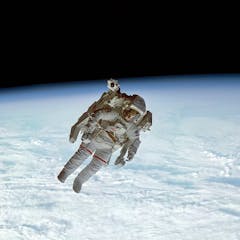
Articles on Cosmology
Displaying 1 - 20 of 137 articles

With the help of a magnifying glass 4 million lightyears wide, astronomers may have solved the riddle of what burned away the hydrogen fog that pervaded the early universe.

Projects under NASA’s CLPS program – including the Odysseus lander that made it to the lunar surface – will probe unexplored questions about the universe’s formation.

After a decade studying thousands of supernovae, astronomers are still perplexed by the enigma that led Einstein to his ‘greatest mistake’.

Sixty years ago, philosopher Hannah Arendt argued an interplanetary perspective may be bad news for humanity as we know it.

If we lived in a cosmic area with below average density, it would explain recent contradictory measurements of the universe’s expansion.

The universe is expanding faster than physicists would expect. To figure out what processes underlie this fast expansion rate, some researchers are first trying to rule out what processes can’t.

To the ǀXam and San people, being in the world as a person includes “the sky’s things” - an understanding of and deep connection with the cosmos.

Bright, flickering galaxies called quasars were thought to pose a problem for our understanding of the cosmos – but new research shows Einstein was right yet again.

The darkness of the night sky seems so obvious as to need no explanation – yet it has intrigued and baffled scientists for centuries.

Different measures of the rate of the Universe’s expansion give different results – and a new measurement technique only makes matters more complicated.

The enigma at the centre of our 20-year collaboration was how the Big Bang could have created conditions so perfectly hospitable to life

A spacecraft set to launch this year will throw a spotlight on the mysterious ‘dark side’ of the universe.

For decades physicists have argued over the nature of the elusive dark matter that pervades the Universe. A clever new study uses gravitational lensing to bring new evidence to the debate.

The current race to the Moon is opening up opportunities for lunar astronomy.

Some physicists think we live in a multiverse, surrounded by universes not quite like our own. What does that mean for life?

To date, we have not heard from any aliens. Nor have we seen any – but here are the fascinating projects working to change that.

The discovery of massive, early galaxies could force scientists to rethink how the first galaxies formed after the Big Bang.

Astronomers have detected a radio glow caused by shockwaves in the gigantic filaments between galaxy clusters in the ‘cosmic web’ which pervades the Universe.

Astronomers have found that mysterious dark energy may originate in black holes.

While we can’t see inside a black hole, we can spot the intensely bright glowing disc that surrounds one. Now, we might better understand why these discs appear to ‘twinkle’.





